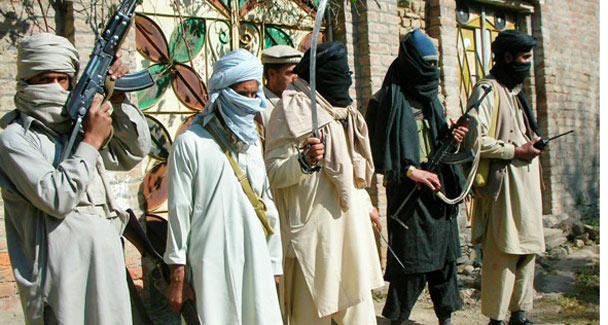|
Our gods of Hatred
By Kausar S K

The state empowers parallel forces by ignoring their injustices and weakening its own systems
through interference and nepotism. — Reuters
A nation is born with the birth of ‘the other’, as the latter helps identify ethnic, linguistic and cultural differences. ‘Until I came to Karachi, I thought everybody was a Punjabi,’ said a bemused friend.
The problem is not with the discovery of one’s collective identity. The predicament begins with the transformation of ‘the other’ into a threat, or when it is relegated to a sub-human status as reflected in sectarian killings or the carnage wreaked by the Taliban.
Relationships with ‘the other’ are not always sour, but demonisation results in bitterness and therefore, bloodshed. In Pakistan today, many demons have been constructed — the Taliban have slaughtered their ‘rivals’ and destroyed property; nationalists are killing non-locals in Balochistan, and Sindh has seen some nationalists flex their muscles against the IDPs. Meanwhile, the MQM in Karachi is blamed for much intolerance.
Killers are possessed by their own gods of hatred. They may blame their actions on a history of exploitation, or a current deprivation of their resources; but they forget that no historical analysis can justify violence. Criminal behaviour, after all, is not inherited, except in the minds of those who believe in revenge. Similarly, state violence, such as killings and kidnappings by intelligence agencies, cannot justify violence committed by nationalist militants.
The license issued by the gods of hatred to kill innocents — a vendor, a teacher, office workers, students, party workers — is a crime against humanity. Whether a Pakistani is a Taliban wanting to kill his ‘other’, a Baloch determined to shoot an outsider on sight, a Sindhi becoming violent towards non-Sindhis, or the Urdu-speaking targeting Pakhtuns in Karachi, all share a common element — each has a god of hatred.
But despite flaunting their brutalities, perpetrators don’t face state resistance — take for example the Sindh High Court ruling that jirgas are illegal, yet newspapers are replete with news of karo kari incidents; little girls are given away to resolve conflicts between families; and families threatened by the powerful, try endlessly to reach courts of justice. There are laws against murder, but non-locals are gunned down with impunity in Quetta. Similarly, a militant group in Karachi chooses to kill and maim at will. Indifference, a common state response to such violence, strengthens the power of parallel systems.
The leadership in Pakistan, whether military or civilian, lacks a sense of public good. Their sense of self-aggrandizement is high and their constant interference in the independent functioning of official services and systems is rampant. Well-functioning bureaucracies and various services, especially the police and the courts, would not be in their interest. What the rulers perhaps overlooked was the consolidation of parallel power to the point that it came to challenge the writ of the state — the Taliban being the best example and Baloch nationalists a close second.
The state empowers parallel forces by ignoring their injustices and weakening its own systems through interference and nepotism. The government also lacks moral authority in Pakistan as its leadership, whether in uniform or in civilian garb, consistently fails to establish a relationship with the people. The people of Pakistan are exceptional when it comes to forgiving their leadership; but sadly, leaders see them as distant beings, not worthy of attention. And hence, it is from the same populace that gods and followers of hatred rise.
A disturbing indicator of a collective sense of resignation is the absence of public protests in areas of violence. Civil society comprises groups guided by principles of equality, who demand state protection and promotion of human rights. It thus mediates between the state and its citizens. Its forte is to protest against all forces of oppression, as is repeatedly carried out by women and human rights groups on various issues if brutality, such as the protests that burst forth against the murders of women in Jafarabad, or the public flogging of a 17-year-old girl in Swat.
Pakistan has also demonstrated a remarkable ability to take a principled stand on a national level in the form of the lawyers’ movement. There are also a large number of religious groups that are unequivocally against rampant injustices, but are silent when the gods of hatred become active. There is no dearth of goodwill in Pakistan — recall the response to the earthquake — yet when bloodbaths begin, protests are rare.
There are three primary forces in Pakistan: the state, the armies of the gods of hatred and civil society. Today, the latter must act firmly, promptly and persistently against all groups that adorn the crown of hatred.
It is imperative that it is visible at the scene of crime and not only in distant cities. Society must reinforce that all Pakhtuns are not Taliban; all Baloch are not supporters of the killings of non-locals in Balochistan; all Sindhis are not anti-IDPs. Civil society goes beyond ethnic and religious divides as it acts on the basis of all humanity.
DAWN: Thursday, 02 Jul, 2009
Back to Exclusive Articles Section
|

